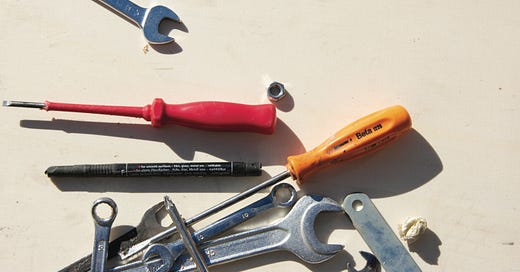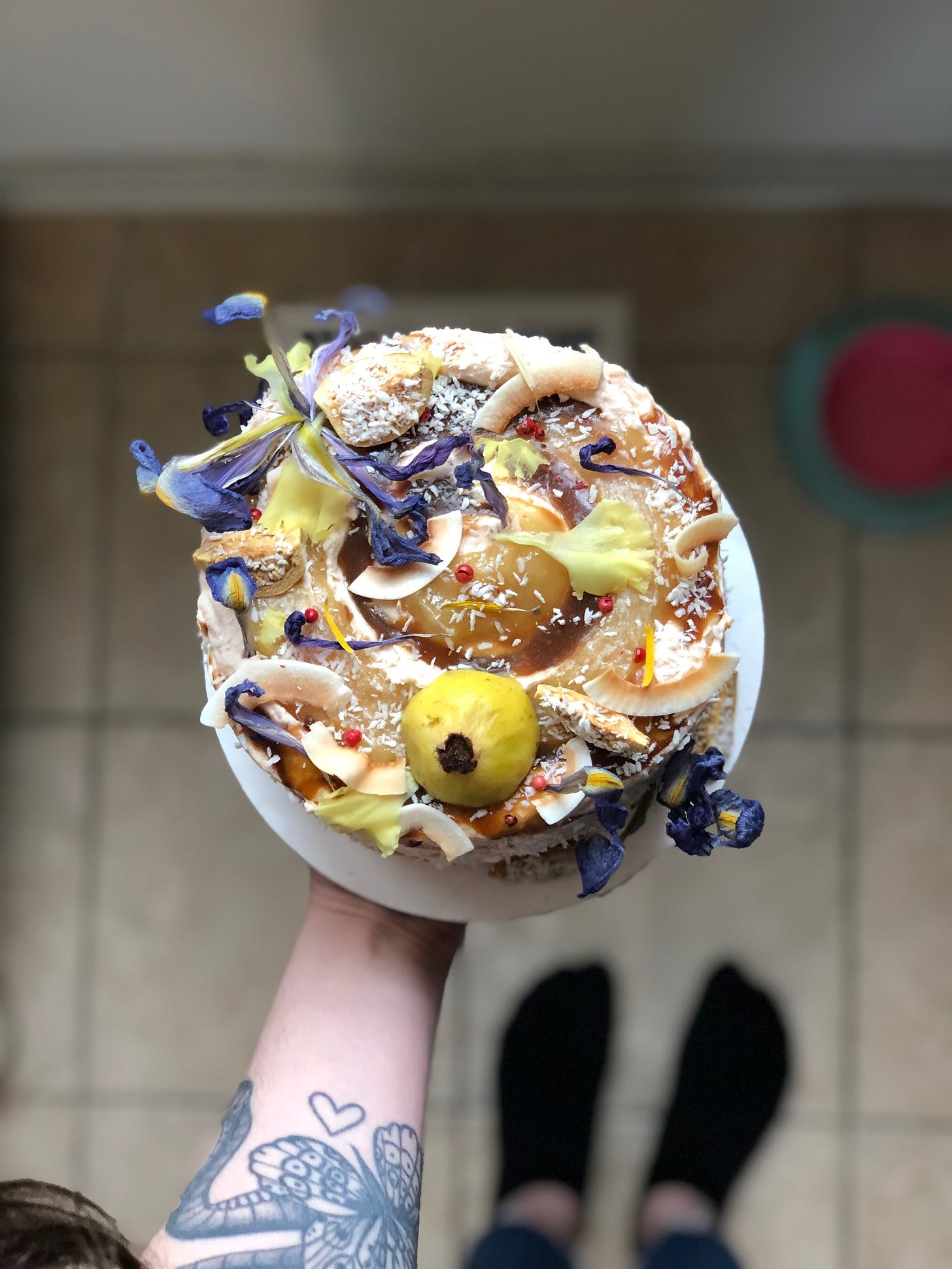Creating a Better Vision of Society
Coffee shops have the power to reflect, and even build, the vision of society we aspire to
Boss Barista is a weekly newsletter and podcast series about workplace equity and employee empowerment in coffee and beyond. If you’re not already subscribed, welcome! I’m glad you found your way here. Before you go, sign up, will ya? Here’s a cute little button to make it easy:
If the following piece resonates with you, consider donating to my Patreon. Pledges of any size help me produce these stories, and your support is gratefully received.
Coffee shops can help manifest the society we wish to see.
Almost every neighborhood has some version of a coffee shop. A place for folks to gather, to see friends, to linger without pretense. You don’t need to be doing anything in particular to sit and enjoy a cup of coffee, and in an ideal society, a coffee shop would reflect the myriad people and experiences that inhabit its locality.
Simply put, a coffee shop should reflect its surrounding community.
On the latest episode of the podcast, I interviewed Doug Hewitt, co-founder of 1951 Coffee Company in Berkeley, California. Doug helped start 1951, which operates three cafes and a barista training program specifically aimed at refugees.
In the episode, Doug talked about why coffee shops in particular are poised to welcome refugees:
I knew that the coffee industry is all based around hospitality, around welcoming people, around building community. And I thought, “What better way for cafes in the coffee industry to step in and be a part of the solution for the challenges refugees face when they want to resettle in the U.S.?”
He adds:
To me, that was so encouraging that the coffee industry would be willing to step up and say, “You know what? Yeah, we can do this. We can bring people into our team.” As we worked with these different companies, we’re not asking people to hire 25 people at one company, but to bring one person in, help build that one person up, help make them a part of your team, welcome them into your cafe, welcome them into your community.
I followed up with Doug, and he added via email, “Coffee shops exist all across the country and can be a starting point for creating the type of society we hope our country embraces. The culture we create in 1951 Coffee’s cafes with our staff and with our customers can be exemplary of the type of society we want to build.”
This quote reminded me of my interview with Sarina Prabasi of Buunni Coffee in New York. She wrote a book called The Coffeehouse Resistance: Brewing Hope in Desperate Times, which is part-memoir, part-call to action on the power and role of coffee shops to spark societal change. During and after the 2016 presidential election, Sarina used Buunni as a meeting point for folks to write letters to congresspeople and gather to exchange ideas.
This is a radical reclamation of what coffeehouses used to be from what they’ve become. Sarina writes, “Coffeehouses, too, have been corporatized and neutralized. In place of revolutionary ideas and political organizing, the modern coffeehouse is depoliticized and a pleasant but transactional place.”1
Both Sarina and Doug believe coffeehouses can spark change. The examples that Sarina cites involve direct action (“Let’s all meet at the coffeeshop and we’ll go on a march together,” for example), while Doug sets an aspirational example of what society can look like. Both are incredibly important and require shop owners to anchor themselves in their communities and set goals for what they want their spaces to achieve.
I hope this is a conversation shop owners have when they consider opening a new store. That’s why I’m wary of shops that pursue aggressive growth or random dudes who think owning a coffeeshop is little more than a fun vanity project. Coffee shops have so much unrealized potential and power to model what a community can look like, and they can provide a space for people to exist safely within their neighborhoods.
I’m afraid too many owners ignore this responsibility—but I’m hopeful that examples set by folks like Sarina, Doug, Amanda-Jane Thomas and Shanita Nicholas of Sip & Sonder, and Jiyoon Han of Bean & Bean, just to name a few, will help actualize this vision and power.
Before you go…
“For people who believe in the Laziness Lie, things like economic reform, legal protections for workers, universal health care, and welfare programs seem unnecessary. Those who want to succeed just need to pull themselves up by their bootstraps, after all.” I’ve been thinking a lot about the myth of “hard work” in light of the controversy caused by Rachel Hollis—a person whose job I cannot figure out beyond “wellness influencer”—who not only seems to imply that she works harder than folks who do domestic labor (“the woman who cleans my toilet” she kept saying in an infamous IG Live video that has since been deleted), but that the path between hard work and success is linear.
Hollis’ brand is all about personal ownership of happiness and success: If you work hard, you’ll be rewarded. She also implies the converse: If you’re not successful, it’s because you didn’t work hard enough. Devon Price breaks down the Laziness Lie and how the idea of laziness is rooted in racism, and has extended outward to harm marginalized communities over time.
I was deeply disappointed in this piece from the New York Times about restaurants struggling to find applicants as COVID restrictions drop and positions become available. Again, we seem to be stuck in this loop of blaming generous unemployment benefits as the reason employees don’t want to go back to work, reinforcing the Laziness Lie and ignoring things like safety, fair wages, the instability of service work, and the lack of protections service employees are often afforded.
As a person who has worked in and writes about coffee, I rarely make coffee at home. I wake up much, much later than my partner, and he’s always got a pot of coffee going by the time I’m up. However, I’m writing a coffee equipment review and I’ve really enjoyed brewing coffee with my Fellow Prismo Aeropress attachment, which has a valve that helps build up pressure and gives you an espresso-like beverage.
Some of you might have noticed it was my birthday a few weeks ago—I told no one but I did share a beautiful cake made by Butterbird Bakery here in Chicago. I told Kat about how my grandmother would sometimes cut up pieces of guava paste and smear a graham cracker with cream cheese and call it dessert and they came up with a decadent cake including a coconut pound cake base, passionfruit butterscotch, and a pink peppercorn and vanilla bean guava butter. Here’s a photo:
Football player Aaron Rodgers is the current guest host of Jeopardy!, and he’s been very clear (and does some quick mental math) that he’d like to be in the running for the show’s permanent host. This is the type of news I have a Google alert set for.
Hold up! You made it to the bottom of this article—thank you for reading! If you enjoyed this piece, you can make a difference by:
Clicking the ‘heart’ at the bottom to say you liked this article
Checking out my Patreon
Sharing this with a friend, on your social media, or anywhere—here’s a button for you to do so:
This quote is so interesting to me—and I think needs to be unpacked more. As coffeeshops become less politicized and more transactional, they contribute to toxic capitalist pursuits that perpetuate white supremacy. Think the whitewashing of coffeeshops and how they’ve become the embodiment of gentrifying neighborhoods. I haven’t sorted all my thoughts, but I hope to explore this idea in a future newsletter.





